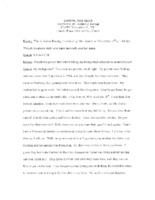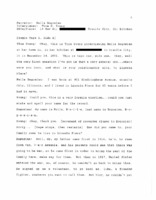Browse Items (41 total)
| Thumbnail | Title | Description | Date | Date Added |
|---|---|---|---|---|
 |
Luis Ybarra Oral History Interview | This oral history interview with Luis Ybarra was part of oral histories conducted in the fall 2001 semester of History 447: Oral History. Luis Ybarra was born May 6, 1957. He talks about his lifelong residency in the Lincoln Place neighborhood. Born in 1957 to Mexican immigrants, Luis worked for the Madison County Highway Department and was a member of the Mexican Honorary Commission. Among many other topics, Luis talks about his personal history, life, and times in Madison County. |
November 3, 2001 | March 18, 2018 |
 |
Margaret Nonn Oral History Interview | This oral history interview with Margaret Nonn was part of oral histories conducted in the fall 2001 semester of History 447: Oral History. Margaret Nonn was born in Lincoln Place to German immigrant parents and lived in the area for over eighty years. In this interview, she talks about the rivalry between Lincoln Place and West Granite, her life growing up in the Lincoln Place community, the diversity of the community and the struggles it experienced due to it, working in a ‘rag shop’ in St. Louis, becoming a bailiff at Madison County Jail, and religious aspects of her life. |
November 6, 2001 | March 17, 2018 |
 |
Marvin Moehle Oral History Interview | This oral history interview with Marvin Moehle was part of oral histories conducted in the fall 2001 semester of History 447: Oral History. Marvin Moehle was born and raised in Lincoln Place. In this interview, he talks about his family business, the diversity of the Lincoln Place community, and his Macedonian heritage. There is no transcript with this interview but there is a biographical summary. |
December 1, 2001 | September 2, 2018 |
 |
Mary Asadorian Oral History Interview | This oral history interview with Mary Kambarian Asadorian was part of oral histories conducted in the fall 2001 semester of History 447: Oral History. Mary Asadorian was born and raised in Lincoln Place, where she spent her life. In this interview, she talks about her childhood, the role of the Armenian Orthodox Church, the diversity of Lincoln Place, the community center, and her family heritage. |
October 27, 2001 | February 18, 2018 |
 |
Mary Bogosian Carson Oral History Interview | This oral history interview with Mary Bogosian Carson was part of oral histories conducted in the fall 2001 semester of History 447: Oral History. Mary Carson was raised in Lincoln Place where she spent most of her life. In this interview, she talks about her childhood, the diversity of Lincoln Place, the “Clubhouse” where kids would spend their time, and the 1940s basketball championship team. |
November 10, 2001 | February 20, 2018 |
 |
Mary Spaich Oral History Interview | This oral history interview with Mary Spaich was part of oral histories conducted in the fall 2001 semester of History 447: Oral History. In this interview, Mary Spaich discusses growing up in the Lincoln Place neighborhood of Granite City. She was born in Granite City in 1916 to Serbian parents who had immigrated from Yugoslavia in 1914. She describes her life in Lincoln Place and changes in the area since her childhood. |
November 16, 2001 | April 29, 2020 |
 |
Michael Torosian Oral History Interview | This oral history interview with Michael Torosian was part of oral histories conducted in the fall 2001 semester of History 447: Oral History. Mr. Torosian is a first-generation American. His father emigrated from Armenia in 1913. His mother was a refugee; she emigrated sometime after the genocide of the Armenians in 1915. Mr. Torosian was born in Lincoln Place and describes growing up there as the most wonderful childhood anyone could have. He lived there for the first twenty-nine years of his life, excluding the time he was in the service. Mr. Torosian indicated that the community center played a major part in his life as a child. He states that from the age of eight or nine, he was there almost every night. He stated that the Community Center was the envy of the surrounding area. The combination of caring people, citizenship classes, sewing classes and a beautiful basketball gymnasium made the center a wonderful place. Additionally, the fact that it was paid for by Mr. Howard and constructed with local labor provided employment for many families in Lincoln Place during the depression. Mr. Torosian described the mix of different ethnic groups as educational. Lincoln Place provided the structure for education about many different cultures. Everyone learned from each other. The sense of community was very evident in Lincoln Place. Mr. Torosian and I also discussed the Armenian Genocide and issues surrounding its lack of acknowledgment and publicity. He graciously states that genocide was the responsibility of the regime in charge at the time, and not all the Turks. |
November 15, 2001 | March 18, 2018 |
 |
Millie Chandler Oral History Interview | This oral history interview with Millie Chandler was part of oral histories conducted in the fall 2001 semester of History 447: Oral History. Millie Chandler was born and raised in Lincoln Place until she moved in 1951. In this interview, she describes her childhood, the diversity of the community, playing music in the community center, and how she felt outside communities viewed those that resided within Lincoln Place. |
October 29, 2001 | February 20, 2018 |
 |
Nazareth Donjoian Oral History Interview | This oral history interview with Nazareth Donjoian was part of oral histories conducted in the fall 2001 semester of History 447: Oral History. Naz, as he is better known by, was bom November 22, 1924. His father was a chef and ran a tavern and boarding house for many years. Naz also owned and ran a tavern for a number of years. While in high school, Naz got a job at the U.S. Army depot just down the street and worked there for part of his senior year. After graduation, he worked there a short period of time at the depot before being drafted, he entered the U.S. Army in June 1943 and was assigned to the U.S. Army Air Corps. He received training as a airplane and engine mechanic and spent a total of32 months in the military. The war ended before he was shipped overseas and upon discharge he returned to Granite City. He had return rights to his former job at the depot. After being home for two weeks and listening to his dad constantly asking him when he was going to get a job, Naz returned to work a the depot. He held a number of jobs and over the years suffered a number of Reduction In Force (RIF) realignments of personnel. However, after each RIF he was fortunate enough to move up in pay grade and after forty two years of combined military and civilian service, retired as a GS-12. |
November 3, 2001 | February 20, 2018 |
 |
Nelle Bogosian Oral History Interview | This oral history interview with Nelle Bogosian was part of oral histories conducted in the fall 2001 semester of History 447: Oral History. Nelle Bogosian was born to Armenian parents and spent most of her life in Lincoln Place. In this interview, she talks about her parent’s escape from the Armenian Genocide and lack of US recognition for the event, her schooling and social experiences in Lincoln Place, the community center, pool hall, and different cultural celebrations within the Lincoln Place community. |
November 1, 2001 | February 20, 2018 |
